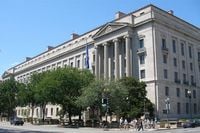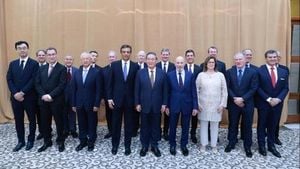Federal prosecutors and top Department of Justice (DOJ) officials have come under intense judicial scrutiny after a series of public statements—many echoing President Donald Trump’s own remarks—cast Luigi Mangione, the accused killer of UnitedHealthcare CEO Brian Thompson, as guilty before trial. In a rare and stern rebuke, U.S. District Judge Margaret M. Garnett warned on September 24, 2025, that such comments may have violated court rules designed to protect Mangione’s right to a fair trial, and ordered the DOJ to explain how these statements came to be made and what would be done to prevent future breaches.
The controversy erupted after Mangione’s defense team filed a detailed letter and a 118-page motion to the court, arguing that statements from President Trump, DOJ officials, and other members of the administration had “baselessly” tied Mangione to “left-wing extremist groups” and a broader narrative of radical political violence. The defense asserted that these pronouncements, amplified across social media and official channels, not only prejudiced the jury pool but also violated Local Criminal Rule 23.1, which explicitly bars government agents from making public comments about a defendant’s guilt or innocence before trial. According to Truthout, Judge Garnett cited this rule in her order, emphasizing that non-lawyer DOJ employees are forbidden from releasing any opinion that could “interfere with a fair trial or otherwise prejudice the due administration of justice.”
The chain of events began on September 18, 2025, when President Trump appeared on Fox News and declared, “Mangione shot someone in the back as clear as you’re looking at me… he shot him right in the middle of the back – instantly dead… this is a sickness. This really has to be studied and investigated.” This clip was promptly shared by Chad Gilmartin, a DOJ spokesperson, who posted on X (formerly Twitter) that the president “is absolutely right.” The post was subsequently retweeted by Brian Nieves, the chief of staff to Deputy Attorney General Todd Blanche. Both posts have since been deleted, but screenshots were included in the defense’s court filing. As ScheerPost and New York Daily News reported, these actions appeared to be in direct violation of Judge Garnett’s previous orders and federal rules barring prejudicial publicity.
Judge Garnett’s order was unequivocal: “The statements referenced in the [letter from Mangione’s legal team] by two high-ranking staff members of the Department of Justice, including within the Office of the Attorney General, appear to be in direct violation of this Rule and the Court’s April 25 Order.” She directed prosecutors to explain by October 3 how the posts occurred and what safeguards would be instituted to prevent further violations, warning that future breaches could result in sanctions—including financial penalties, contempt of court, or relief specific to the prosecution.
But the DOJ was not alone in making such statements. On September 22, 2025, White House Press Secretary Karoline Leavitt referred to Mangione as a “left-wing assassin” in a press briefing. That same day, a White House press release titled “President Trump Isn’t Backing Down from Crushing Radical Left Violence” not only designated Antifa as a domestic terrorist organization but also included Mangione’s alleged actions in a list of “Radical Left violence.” The following day, White House Deputy Chief of Staff for Policy Stephen Miller went on Fox News to claim, “Of course the healthcare CEO was brutally gunned down by another self-described so-called anti-fascist that was then celebrated by other self-described anti-fascists, so of course, really communist revolutionaries.” Miller reposted this clip on social media, further amplifying the message. According to Truthout, Mangione’s attorneys responded, “The Government has indelibly prejudiced Mr. Mangione by baselessly linking him to unrelated violent events, and left-wing extremist groups, despite there being no connection or affiliation.”
The defense’s filings also referenced the national political climate, pointing to the recent assassination of right-wing commentator Charlie Kirk on September 18, 2025. They argued that attempts to connect Mangione to that incident and to label him as a “left wing” violent extremist were “false, prejudicial, and part of a greater political narrative that has no place in any criminal case, especially one where the death penalty is at stake.” The defense further asserted that Mangione “does not support these violent actions, does not condone past or future political violence, nor is he in any way aligned with the group mentioned in the White House press release.”
Federal prosecutors, meanwhile, are pursuing the death penalty in Mangione’s case, citing President Trump’s Executive Order “Restoring the Death Penalty and Protecting Public Safety,” which directs executions “where possible.” On September 25, 2025, Trump issued another Executive Order, “Countering Domestic Terrorism and Organized Political Violence,” referencing a “2024 assassination of a senior healthcare executive” as part of a broader pattern of violence under the banner of anti-fascism—though neither Mangione nor Thompson were named directly.
Mangione, a 27-year-old Italian American dual citizen and Ivy League graduate, is accused of shooting and killing Brian Thompson outside a Midtown Manhattan hotel in December 2024, during the annual investor conference for UnitedHealthcare. He faces both federal and state charges but has pleaded not guilty to all counts. As reported by New York Daily News and Truthout, Mangione’s defense is seeking to have the federal case dismissed on constitutional grounds, arguing that the government’s conduct has irreparably tainted the proceedings and rendered the case ineligible for the death penalty.
The legal wrangling comes on the heels of a Manhattan judge’s decision last week to drop two terrorism charges in Mangione’s state case, ruling that the alleged actions did not fall within New York’s terrorism statute. Mangione still faces murder and weapons charges at the state level, with his next court appearance scheduled for early December 2025.
The DOJ has not responded to requests for comment from multiple outlets. Judge Garnett has made clear that the court will also review additional allegations raised by the defense, including those involving statements by President Trump and other high-profile officials, when considering motions to dismiss the case or to bar prosecutors from seeking the death penalty.
As the December court dates approach, the case has become a flashpoint in the ongoing debate over political rhetoric, due process, and the responsibilities of government officials in high-profile criminal prosecutions. With the judge’s warning ringing in their ears, DOJ officials and the White House now face mounting pressure to rein in their public commentary—or risk further legal and political fallout.
The outcome of these proceedings may set an important precedent for how courts handle prejudicial publicity in the social media era, especially in cases that sit at the intersection of crime, politics, and public opinion.





